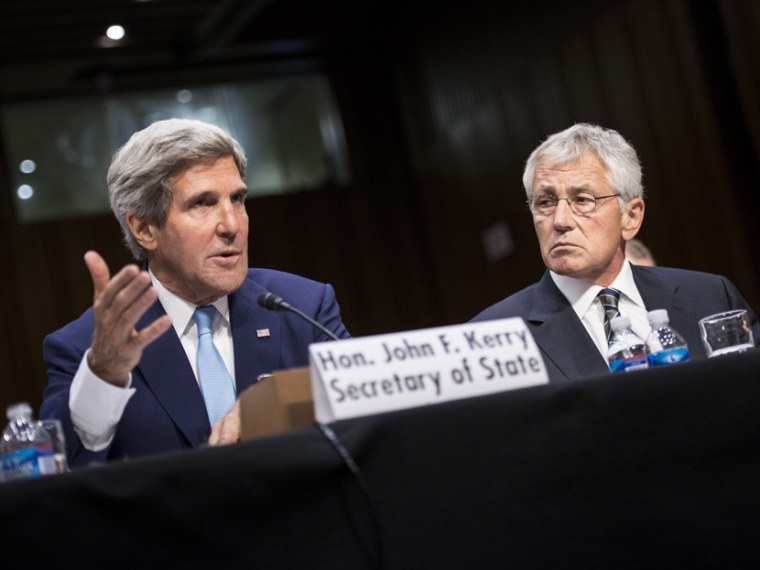Updated 10:15 p.m.
Facing down skeptical questioning by the Senate Foreign Relations Committee, the Obama administration may have won the support it sought for a limited strike on Syria.
Late Tuesday, NBC News obtained a draft of a new bipartisan Syria resolution by Committee Chairman Bob Menendez and Ranking Member Bob Corker. The draft approves the use of military force in Syria, and sets a 60-day deadline, allowing for one 30-day extension. It prohibits the use of ground forces.
"Together we have pursued a course of action that gives the President the authority he needs to deploy force in response to the Assad regime's criminal use of chemical weapons against the Syrian people, while assuring that the authorization is narrow and focused, limited in time, and assures that the Armed Forces of the United States will not be deployed for combat operations in Syria," Senator Menendez said in a statement.
Senators at the Tuesday hearing pushed the Obama administration to explain how a strike on Syria serves U.S. interests, and what the endgame of any intervention would be.
Secretary of State John Kerry told the committee that American credibility would be hurt worldwide if the country chooses to do nothing in the face of President Bashar al-Assad's use of chemical weapons. "This is not the time to be spectators to slaughter," he said.
“I think that it's fair to say that our interest would be seriously set back in many respects if we are viewed as not capable, or willing, most important, to follow through on the things that we say matter to us," said Kerry, who testified alongside Defense Secretary Chuck Hagel and Gen. Martin Dempsey, chairman of the Joint Chiefs of Staff.
"We would be opening Pandora's box with respect to a whole set of dangerous consequences as a result of the United States not keeping its word. And it would make our life very, very difficult with respect to North Korea and Iran," Kerry said. "There's no question in my mind that those countries are watching. The mullahs and many others are watching what we are doing now with great interest. And that's why even the quality of this debate and the nature of this debate are very important.”
The Obama administration has said its intelligence shows Syrian President Assad turned chemical weapons against his own people, killing at least 1,429 people, including more than 400 children, on Aug. 21. Over the weekend the president called on Congress to authorize a “limited” strike on Syria. A year ago, Obama said that Syria’s use of chemical weapons would be a “red line.” He never specified how America would respond if that line were crossed.
Like Kerry, Hagel also argued the mission is in America’s interest, saying the Syrian regime’s use of chemical weapons poses “grave risks” to America’s allies along Syria’s borders, including Israel, Jordan, Turkey, Lebanon and Iraq.
“If Assad is prepared to use chemical weapons against his own people, we have to be concerned that terrorist groups like Hezbollah, which has forces in Syria supporting the Assad regime, could acquire them,” said Hagel.
Republican Sen. James Risch of Idaho was unconvinced. “I am reluctant" to sign on, he said, adding: “If this was an attack against any American, against any American interest, this would be a no-brainer for me.” He said he’s concerned that after a limited strike Assad will “crawl out of his rat hole” and tell his people he stood up to the strongest power on earth and “we’re going to go on with business as usual…What does that do to our credibility?”
Similarly, Marco Rubio of Florida said he’s a “bit skeptical” about the effectiveness of limited strikes and also feared Assad may feel more powerful if he endures a U.S. military assault.
Kerry insisted “that there is no way it will in fact be beneficial for him. That will not translate on the ground.”
Republican Sen. Rand Paul of Kentucky--a staunch non-interventionist--argued there are too many unknowns, that Assad is already acting irrationally and it may not deter another chemical weapons attack. Kerry replied that taking no action "is a guarantee Assad will do it again."
Senator Menendez asked Kerry if the White House was open to a ban on U.S. ground troops being deployed. “I don’t want to take off the table an option that might or might not be available to a president of the United States to secure our country," said Kerry, in the event that Syria imploded or if chemical weapons got into the hands of terrorist groups.
The secretary of state then seemed to backtrack. Kerry said he wanted to “shut that door as tightly as we can,” and that the scenarios he gave were merely hypothetical. “There will not be American boots on the ground with respect to the civil war,” Kerry insisted.
Sen. John McCain, who has been in favor of military intervention, helped Kerry shore up his case. If Congress rejects a resolution, he asked, would that send a “seriously bad message to our friends an allies alike?” Kerry said it would.
“I cannot emphasize enough how much they are looking to us now, making judgments about us for the long term, and how critical the choice we make here will be,” said Kerry.
President Obama got a boost from GOP leaders, including House Speaker John Boehner and Majority Leader Eric Cantor, who both said they would support the president’s request to strike Syria. Key Dems, including Sen. Harry Reid, Rep. Nancy Pelosi, and even former Secretary of State Hillary Clinton are also supporting Obama on Syria.
